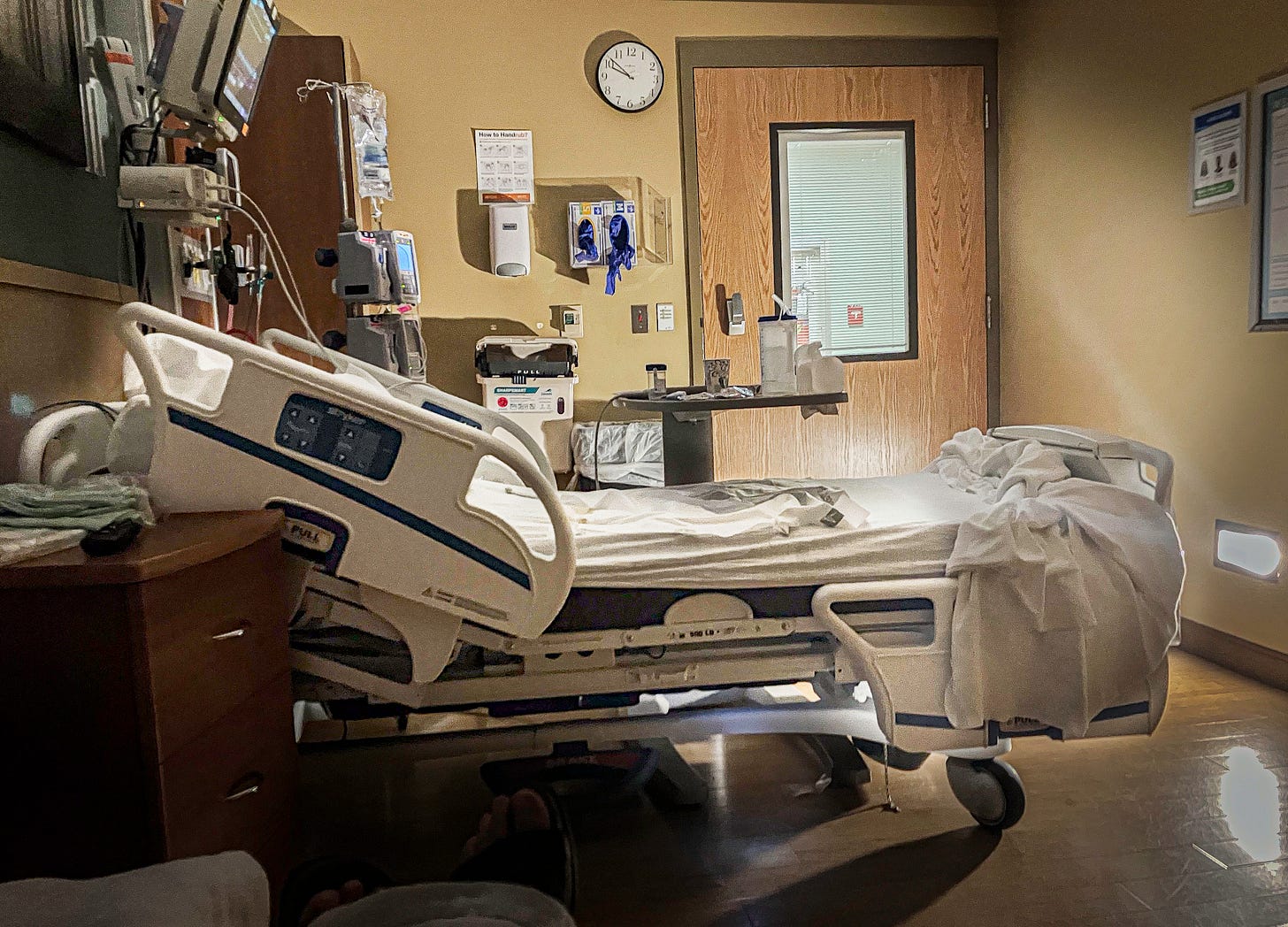John here. At the end of my last post, My Wife Chose My Death, I wrote, “Next time: From her [Cat’s] point of view. So . . . take it away, Cat.
When John asked me to leave that first morning in the hospital, I went numb. How can this be happening? Then I thought that maybe he was right. Maybe my presence was a hindrance to his healing. Could that possibly be true? Maybe it was?
I’d spent hours the day before and throughout that night staring at the monitors he was hooked up to: heart rate, blood pressure, respiration, temperature. I surreptitiously looked them up on WebMD. All of his readings were way past the the rush-the-patient-to-the-hospital range. I was terrified.
In the emergency room John’s face was sunken and an awful shade of pale yellow-green. He couldn’t stop violently shivering. The doctors expected the IV fluids and antibiotics to bring his fever down, but they didn’t. His urine sample looked like cherry Kool-Aid. The alert lights on his monitors keep blinking red. At some point in the night he whispered that he thought he was going to die. He was shivering, so I lay myself over him, to try to keep him warm. He didn’t die.
After five hours they rushed in and wheeled him up to the intensive care unit. I wanted to stay with him. They let me come into the elevator, into his ICU room. The nurses even brought me blankets and a pillow so I could sleep on a visitor’s chair in the room.
The next morning John was no longer shivering. His vitals had improved, but he still had a fever, the alerts were still red, I couldn’t leave. I would go mad with worry if I did.
But this of course cannot be about me. If he needed me to leave, if it would help him, then I must. I try to imagine myself leaving his room, driving home. But I cannot imagine it.
For the two or three weeks before he went to the hospital, John had been getting sicker and sicker. He coughed constantly, and had a high fever that was only somewhat mitigated by the too-high quantities of Tylenol he was taking. Despite my nagging him he wouldn’t go to the doctor. He didn’t think he was that sick.
When he finally understood that he was that sick and went to see his doctor, she gave him an aggressive regime of antibiotics to take. After finishing the seven days of that treatment, John’s coughing was diminished and his fever reduced. Weirdly, though, he still acted like he had a fever: spacey, somewhat disoriented, couldn’t remember what he said a minute ago.
We argued about whether or not he was fit to return to work. He thought I was unjustified in telling him that he shouldn’t. But not a full day after he’d finished his seven days of antibiotics he quickly got much sicker.
That night we went to urgent care, and that morning back to his doctor. In the doctor’s office John had to lie down to keep from passing out. His doctor told us to go straight to a hospital emergency room. In the parking lot we ended up in another disagreement, because John said he felt good enough to drive us to the hospital.
John is the one in our relationship who drives us everywhere; I don’t like driving, and he is a great driver. I feel safe when he drives. One of the big reasons he wanted to drive us to the emergency room was because the car in which he’d driven us to the doctor’s office was our fairly new electric car, a Chevy Volt, which I had never driven before.
“It’s still just a car,” I said. “It’s got brakes, an accelerator, a steering wheel. I think I can figure out how to drive it.”
“Yeah, but it’s not a normal car,” he said. “I feel okay, I promise. I can drive to the hospital.”
“I’m not going to let you drive when you almost passed out ten minutes ago.”
“I did not.”
“You laid down in the waiting room.”
“Well, I could see how it might have seemed like I was on the verge of losing consciousness.”
“Do ya’ think?”
John sighed, and leaned against the car. “Okay. You’re right, I shouldn’t be driving. Thank you, baby. Sorry I’m being so . . . well, you know. Me.”
In many ways John is both the literal and figurative driver in our relationship. He is the one with the confidence, he is the communicator, he is bigger, stronger, faster, bolder, he fixes things, he is calmer in an emergency, much calmer.
I drove us to the hospital. He was right about our car. But I got us there just the same.
In his ICU room the next morning I thought that John was wrong, that he wouldn’t get better with me gone. He needed me. If something happened, I would be there to alert someone. If he wanted his pillow positioned comfortably behind him, if he wanted some water, if he needed Chapstick, or a throat lozenge, or his back needed scratching, I would be there.
If he needed me to lend my strength to his healing by being still and quiet with him, I would be there. It wasn’t like we had never meditated or prayed together.
But my main feeling was that if the worse happened, and John did pass away, I wasn’t going to let him go through that alone. So I wasn’t going to leave. Not matter what, I wasn’t going to leave.
John here. If you buy me a cup of coffee, I’ll give it to Cat.
Next time: Forty-five years later, I realize I’m not alone




Your love for each other is beautiful. You've been through a lot.
Cat is such a good writer, so much better than you John. 🥰